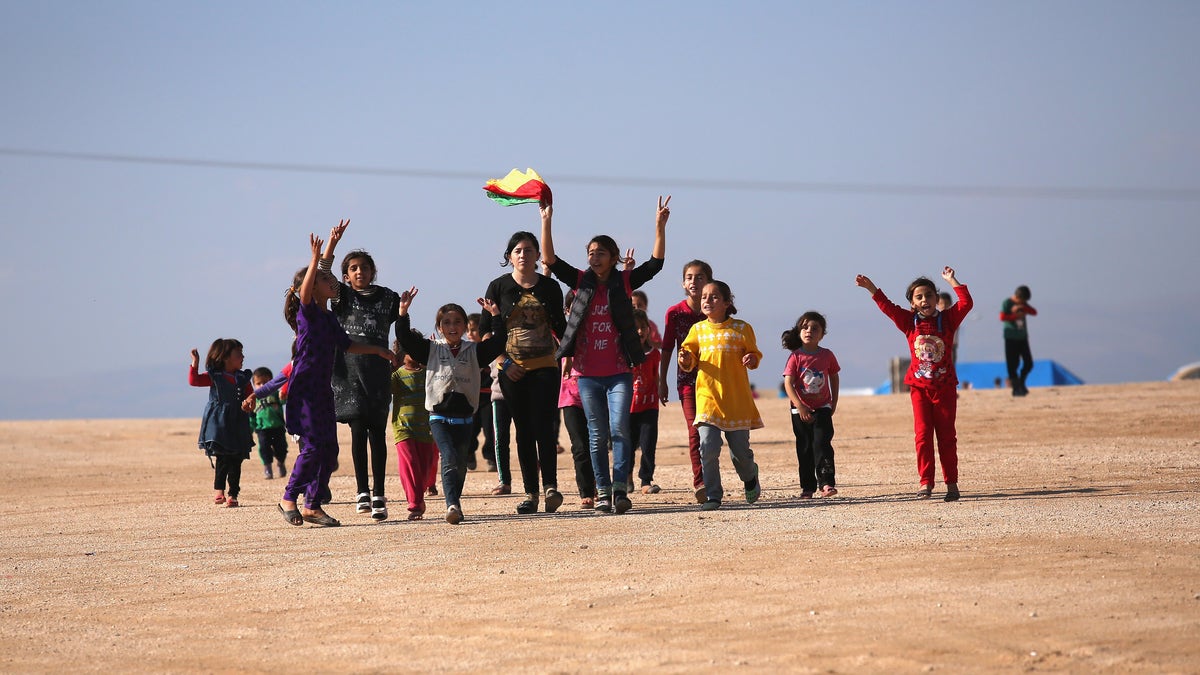
DEREK, SYRIA - NOVEMBER 13: Yazidi refugees celebrate news of the liberation of their homeland of Sinjar from ISIL extremists, while at a refugee camp on November 13, 2015 in Derek, Rojava, Syria. Kurdish Peshmerga forces in Iraq say they have retaken Sinjar, with the help of airstrikes from U.S. led coalition warplanes. The Islamic State captured Sinjar in August 2014, killing many and sexually enslaving thousands of Yazidi women. (Photo by John Moore/Getty Images) (2015 Getty Images)
There are moments when the fear center of the brain takes over and all other cognitive functions cease. And this fleeting response can lead us to do exactly the wrong thing, to run into the fire instead of away. That is what we are living through in a policy sense.
The refusal by more than 30 governors to accept to receive refugees from the Syrian civil war, in the fearful aftermath of the Paris attacks last week, is, on a knee-jerk level, understandable, but it is the equivalent of running into the burning building. The turning away of the refugees makes us less safe from future attack, not more.
America is too strong and too great to be frozen in the fear of moment. That makes the governors’ knee-jerk refusal all the more bewildering and counter-productive.
Let us be clear about who these refugees are: the victims of ISIS. These are people who have been violently driven from their homes, threatened with death, with having their daughters and sons taken from them, who have been labelled, sometimes literally, as enemies of the Islamic State. Among them are the Yazidis, victims of ISIS genocide, Christians and Shia Muslims, marked for religious extermination, as well as so many other targeted groups.
We must also be clear about who these refugees will be: witnesses to the cruelty and barbarism of ISIS terror. They have lived in the belly of the beast. They know the way ISIS argues, works, thinks. They know the cultural pond in which ISIS fishes for recruits. By their very presence, if nothing else, they belie ISIS propaganda. They are living proof of the inhumanity of ISIS, and the humanity and courage of other countries, other visions, ISIS’s enemies. They can act as anti-bodies, as it were, against terrorism.
The United States, in particular, has earned a global reputation as haven for the oppressed. America has stood like a beacon of light for generation after generation of refugees, from the wars of Europe, from anti-Semitic violence in the Soviet Union and Eastern Europe, from Communism in Cuba and Southeast Asia. And these are only a few of the man-made disasters that washed political refugees onto American shores.
In each of these cases, the United States accepted the refugees despite the complexities of geopolitics and a dangerous, uncertain world. In some of these cases, like now, the refugees were escaping declared enemies. And yet, in every case, America was rewarded for its generosity with a community of new Americans: fiercely proud of being Americans and grateful for the chance at a new life they were given. Each of these refugee waves has made America more safe than before, not less.
There are, of course, reasonable apprehensions that policy-makers might have, but the vetting process for the refugees the United States receives is very careful and comprehensive. It has been used, and honed, over hundreds of thousands of cases. Unlike Turkey and Jordan, where millions of refugees have poured across borders, or even Europe, the United States has the luxury of control and choice. That does not mean that a bad apple might not get through, but, just like we do not stop eating apples out of fear of one bad one, we should not refuse to do what we know, from history, makes America stronger.
America is too strong and too great to be frozen in the fear of moment. That makes the governors’ knee-jerk refusal all the more bewildering and counter-productive.
There are also moral and humanitarian reasons for welcoming these poor, blameless victims of terror. It is the right thing to do, the moral thing. But most of all, it is the smart thing. Accepting the refugees makes us more safe, not less.
